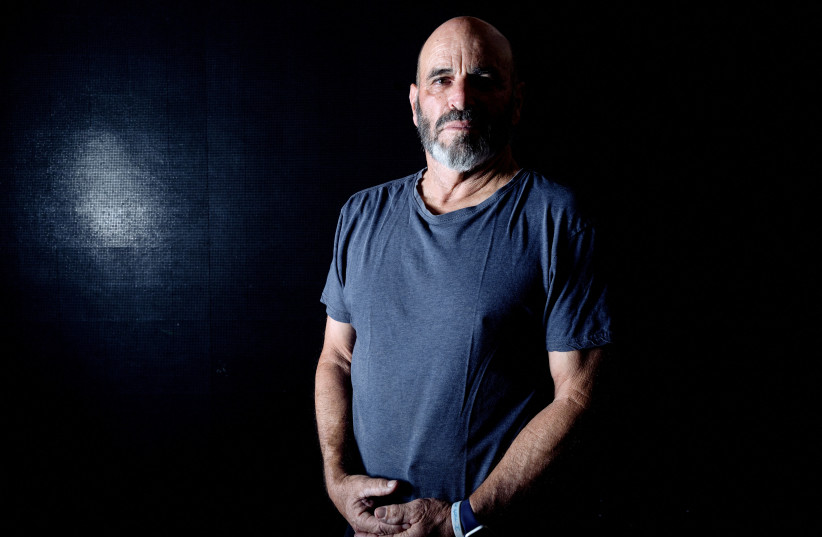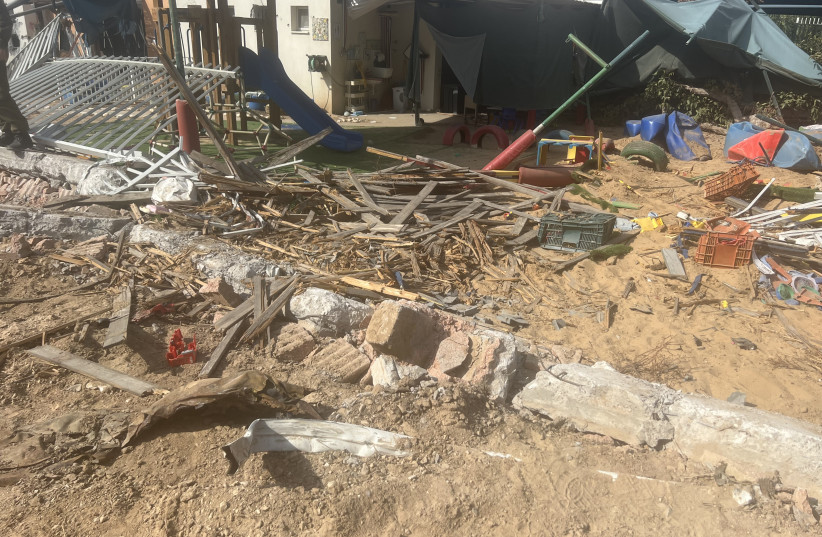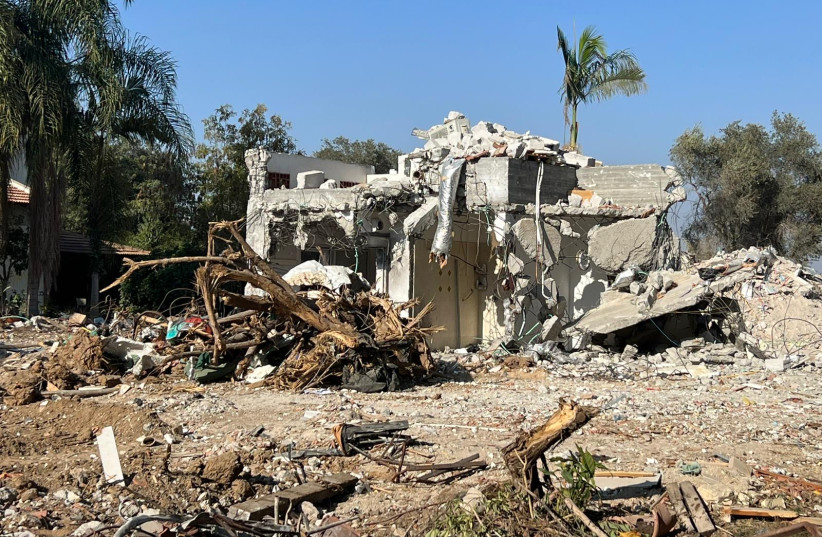It’s been more than a month since the October 7 Hamas massacre, but stories continue to emerge, gradually piecing together the puzzle of that fateful day.
In Kibbutz Be’eri, situated 4 km. from the Gaza border, Rami and Vered Gold, and their granddaughter Hali, like their neighbors, awoke to the unsettling sounds of rocket fire. By 7 a.m., gunshots resonated through the kibbutz.
“Rami is already old, so he is not on the community security team. But he is a fighter,” Vered said with a quiet smile.
As the sounds of bullets grew louder, Rami tried to reach the head of the response team; he had already been taken out. So he tried another member, who answered, begging Rami to come – there were people dead and wounded.
“He just left,” Vered remembered. “He got on his bike. He had no idea [there were terrorists in the kibbutz]. He had nothing with him.”
Three weeks after the massacre, Vered recounted her harrowing experience in almost a whisper while standing on the lawn of the Golds’ home. She happened to be in the kibbutz, collecting belongings, on the day when MK Sharren Haskel and a small group of other politicians and ambassadors visited.

On the other hand, Rami, a member of the kibbutz for 35 years, has been recounting his version for the foreign press since the beginning.
Too old to Fight? Yeah, right
At the age of 70, Rami was no longer allowed to hold a gun. He explained to reporters in late October that the army felt he was too old to be responsible for a rifle. But when he arrived at the community dental clinic on October 7, he knew exactly what to do.
Rami grabbed an M16 rifle from one of his dead friends, and he started to fight.
“I picked up a gun from a dead friend, took a few magazines, and got on an electric cart to pick up another friend who was hurt; that friend died in my arms,” Rami recounted. “It was 10 people facing 100 to 200 well-equipped Hamas terrorists.”
According to Rami: “What happened here [is that] they [Hamas] drove in convoys like ISIS, with heavy machine guns on pickups, shooting their way in – hand grenades and RPGs [rocket-propelled grenades]. Each group had a section in the kibbutz they were supposed to overtake.”
They used the area of the kibbutz where the schools and preschools were located as a command and control center. The response team that came to stop them – all 10 of those people are dead, Rami said.

“Most people were in bomb shelters, because of the rockets,” he continued. Hamas had fired hundreds of rockets at southern Israel to force people into their homes. “They knocked on the doors and asked people to come out. Those who did, they shot. Those who did not, they burned the house and smoked them out. Some of the terrorists didn’t have rifles, so they used axes and machetes and killed everyone in sight.
“Some [residents] they took to the Gaza Strip,” Rami said. “Hopefully, some of them are still alive.”
More than 100 residents of Kibbutz Be’eri were killed, and two dozen were taken hostage.
Rami and another resident continued to fight for 12 hours. They took up a post on a porch in the Olives neighborhood and shot the terrorists as they passed by. Every time they considered relocating, there was another terrorist to fight.
“We got down to the last bullet,” Rami recalled. “Eventually, two angels came – two people, reserve soldiers. We have no idea where they came from. They gave us ammunition and a cell phone so we could call our families and tell them we were okay.
“And then we kept going – until the army arrived,” he continued. “Only then did we have time to go to the hospital and care for our wounds.”
Meanwhile, Vered was holed up alone in her safe room.
“Our house is intact,” she said. “The only damage is from the soldiers that came to rescue me. I was in the safe room. To my luck, they [the Hamas murderers] never entered my house. The door to the safe room does not shut well. If they had entered, I would not have survived.”
She pointed to the Olives neighborhood a few meters away.
“My sister lived in the houses over there, the ones you must have seen; they were burnt down. Her children were on the phone with her. They [the terrorists] came and ripped her from her home. They put her in a room with other residents and shot them all dead.”
“Just awful,” she said with a sigh, struggling to hold back her tears.
Vered recalled how she could hear shooting and then saw a fire outside. On the curb, Hamas terrorists had set the cars on fire, but she just sat in the dark in silence. While the building next to her building also remained unscathed, two doors down, the house was torched. And the terrorists shot everyone in the house next to that one.
Although Kibbutz Be’eri had electricity, she said she did not check the news from her safe room and did not know the extent of what was going on. She did not want to speak for fear of being heard. At one stage, her daughter added her to a WhatsApp group of young kibbutz mothers, and they were all writing in it, begging to be rescued.
“But they were not rescued,” Vered said. “Not all of them.”
The hours passed. When the army came to rescue her around 5 p.m., they called her through the window: “IDF, IDF, come out.”
“Obviously, I did not come out,” she said. “So they broke through her glass sliding door and opened the safe room, four guns pointed right inside.
“I feel bad for the soldiers when I think about it. There I was, hiding behind the couch. They came and picked me up, and I just started screaming, ‘Where were you until now? Where were you?’
“I was crying and screaming at the top of my lungs,” she said.

Vered was rescued even before the battle was over. She and her surviving neighbors ran through the street alongside burning houses and dead bodies, accompanied by soldiers. They exited through the same kibbutz gate through which some of the terrorists had entered. They took a bike path to a nearby cemetery. Eventually, they were transferred from there to Tel Aviv and then to a hotel by the Dead Sea, where the community remains.
She did not hear from Rami until 8 p.m.
Today, Vered said she is angry – at the country, at the army, but mostly because she does not understand how such an event could have occurred in her tiny, peace-loving kibbutz.
“How did they [the army] leave us here for so many hours?” she asked. “They [Hamas] just destroyed this entire area of our country, and there was no one to protect us, no one except the community security teams – they did everything they could,” Vered said. “I’m traumatized. The whole country is traumatized.”
On the other hand, Rami is determined to return home.
“We are going to come back,” he said. “We are going to rebuild this place, as bad as it looks. It is only concrete and metal and some paint. We will help our people, persuade them to come back.”
But he said that it would take a real victory in Gaza for him and his neighbors to feel safe again.
“Something on the other side in the Gaza Strip has to be changed,” Rami contended. “They’ll have to understand that either they will find a way to live with us or they won’t be able to be here. It is us or them.
“I fought in the 1973 Yom Kippur War,” he continued. “It was armies against armies, soldiers against soldiers – not terrorists against civilians. We did not have a chance. I can still hear on the radio people calling for help and dying in the process.
“The world needs to know, needs to understand and remember that Hamas is like ISIS,” Rami stressed. “The next country could be your country. Unless you do something about it, persuade your countries to take action against it, you could be next.”
